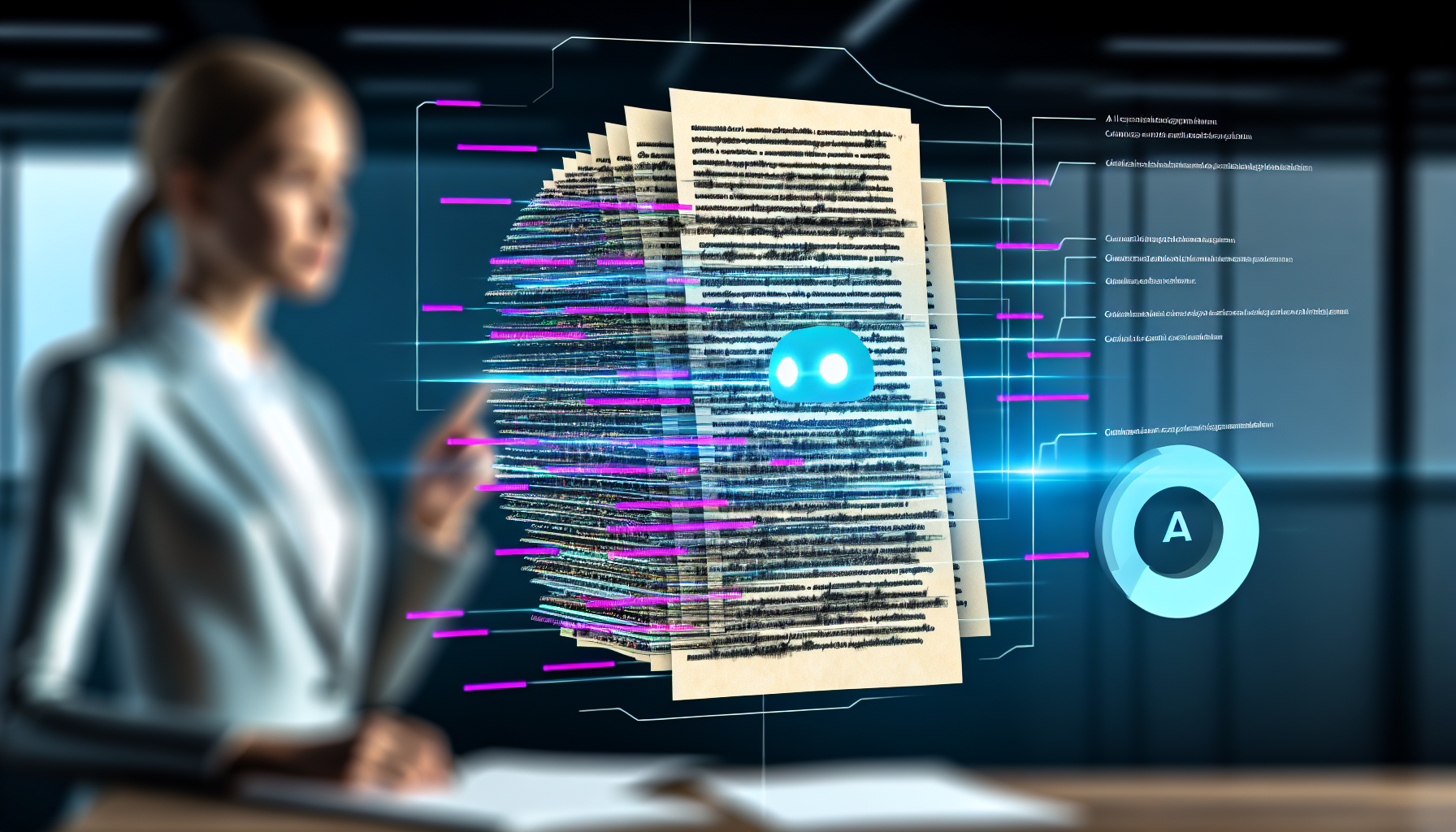Boost Law Firm Efficiency by Automating Contract Review With Legal AI Tools
Estimated reading time: 7 minutes
- Dramatic time reduction in contract review processes.
- Enhanced accuracy and risk mitigation through AI technology.
- Intelligent clause extraction</ for quicker contract assessments.
- Automated summarization of complex contracts.
- Cost reduction by automating repetitive tasks.
Table of Contents
- The Revolution of AI-Powered Contract Review
- Key Benefits
- Understanding the AI Contract Review Process
- Leading AI Contract Review Solutions for 2025
- Important Limitations and Considerations
- Practical Implementation Strategies for Legal Teams
- The Future of Legal Practice
- FAQ
The Revolution of AI-Powered Contract Review
Contract review has traditionally been a labor-intensive process requiring legal professionals to meticulously examine every clause, term, and condition within lengthy documents. This manual approach, while thorough, often creates bottlenecks in legal workflows and diverts valuable resources from strategic advisory work. However, the integration of artificial intelligence into contract review processes is fundamentally changing this paradigm.
AI-powered contract review systems utilize sophisticated algorithms to analyze, interpret, and extract key information from legal contracts at unprecedented speeds. These tools transform what was once a slow, manual process into a streamlined, scalable workflow that can handle massive volumes of documents while maintaining exceptional accuracy. By implementing these technologies, law firms are discovering new levels of efficiency that were previously unattainable.
Key Benefits
The advantages of implementing legal AI tools for contract review extend far beyond simple time savings. These systems offer a comprehensive suite of benefits that address multiple pain points in traditional contract management:
Dramatic Time Reduction
Perhaps the most immediately noticeable benefit is the extraordinary time savings these tools provide. AI contract review software can reduce review times from hours to mere seconds, handling large volumes of contracts far faster than any manual review process. To put this in perspective, a contract review process that might take 92 minutes when performed manually can be completed in just 26 seconds with AI assistance. This dramatic reduction in review time allows legal teams to process significantly more contracts without expanding their workforce, directly impacting the firm’s bottom line and client satisfaction.
Enhanced Accuracy and Risk Mitigation
While speed is impressive, accuracy remains paramount in legal work. AI tools excel in this area by meticulously identifying inconsistencies, missing clauses, unusual terms, and potential risks that human reviewers might overlook during lengthy review sessions. Studies indicate that these systems can reduce human error by up to 10%, a significant improvement when dealing with high-stakes legal documents.
These tools are particularly adept at flagging risky or non-standard clauses, such as uncapped indemnities or unusual liability provisions. They also highlight compliance issues, including missing GDPR-required language or other regulatory requirements specific to different jurisdictions. This comprehensive risk assessment capability helps law firms protect their clients’ interests more effectively while reducing their own professional liability exposure.
Intelligent Clause and Term Extraction
Modern AI systems automatically identify and extract key clauses from contracts, including confidentiality provisions, termination conditions, dispute resolution mechanisms, and more. This capability enables lawyers to quickly assess the core terms of a contract without reading every line, allowing them to focus their expertise on areas requiring human judgment and strategic thinking.
The extraction process goes beyond simple identification. These tools categorize obligations, exclusions, and conditions, creating a structured overview of the contract’s essential elements. This organized approach to information extraction significantly enhances the efficiency of contract negotiations and due diligence processes.
Automated Contract Summarization
For complex or voluminous agreements, AI generates concise summaries that provide high-level overviews of payment terms, obligations, warranties, and other critical provisions. This summarization capability is invaluable when dealing with lengthy master agreements or when conducting rapid portfolio reviews. Legal professionals can quickly grasp the essence of multiple contracts, enabling faster decision-making and more efficient resource allocation.
Advanced Version Comparison
Contract negotiations often involve multiple rounds of revisions, making it crucial to track changes accurately. AI tools excel at instantly detecting changes or discrepancies between contract versions, identifying added, deleted, or altered clauses with precision. This capability supports more efficient negotiation processes and ensures that no critical changes go unnoticed during the review cycle.
Comprehensive Compliance Verification
Regulatory compliance is a growing concern for organizations across all industries. AI-powered contract review tools verify that contracts include required regulatory language and comply with relevant laws, such as data protection requirements, industry-specific regulations, and jurisdictional mandates. This automated compliance checking helps law firms avoid costly oversights and ensures their clients remain compliant with evolving regulatory landscapes.
Significant Cost Reduction
By automating repetitive tasks, law firms can substantially reduce operational costs while maintaining or improving service quality. The cost savings extend beyond direct labor costs to include reduced errors, faster turnaround times, and the ability to handle larger volumes of work without proportional increases in staffing. These efficiencies allow firms to allocate resources to more strategic, revenue-generating activities that require human expertise and creativity.
Understanding the AI Contract Review Process
The implementation of AI in contract review follows a systematic workflow designed to maximize efficiency while maintaining quality control:
Step 1: Document Upload
The process begins when contracts are uploaded to an AI-powered contract lifecycle management (CLM) platform. These platforms typically support various file formats and can handle bulk uploads, making it easy to process large contract portfolios efficiently.
Step 2: Intelligent Analysis
Once uploaded, the AI system converts unstructured contract text into structured, searchable data. The technology identifies key clauses, extracts relevant information, and compares the content against pre-defined standards or playbooks established by the firm. This analysis phase leverages natural language processing to understand context and meaning, not just keywords.
Step 3: Risk Flagging and Recommendations
The system automatically flags risks, missing clauses, or unusual terms that deviate from standard practices or firm policies. More advanced systems go beyond simple flagging by suggesting edits or providing alternative language that aligns with best practices. These recommendations are presented in an intuitive interface that allows reviewers to quickly understand and act on the identified issues.
Step 4: Human Oversight and Final Review
Despite the sophistication of AI tools, human expertise remains essential. Lawyers review, confirm, or modify AI-generated suggestions, ensuring that final decisions reflect professional judgment and client-specific considerations. This hybrid approach combines the efficiency of AI with the nuanced understanding that only experienced legal professionals can provide.
Leading AI Contract Review Solutions for 2025
The market for AI contract review tools has expanded rapidly, with several platforms emerging as industry leaders:
- LEGALFLY: Known for its intuitive interface and comprehensive feature set
- Ironclad: Offers robust integration capabilities and enterprise-grade security
- ContractSafe: Provides excellent value for small to medium-sized firms
- Other specialized platforms: Various solutions tailored to specific practice areas or industries
Each platform offers unique features and capabilities, making it important for firms to evaluate their specific needs when selecting a solution.
Important Limitations and Considerations
While AI contract review tools offer tremendous benefits, it’s crucial to understand their limitations and implement them thoughtfully:
Human Judgment Remains Essential
AI augments but does not replace legal expertise. These tools excel at pattern recognition and routine analysis but cannot replicate the strategic thinking, contextual understanding, and creative problem-solving that experienced lawyers bring to complex legal matters. Final decisions and nuanced interpretations still require human oversight to ensure that client objectives are met and legal strategies remain sound.
Data Security and Confidentiality
Law firms must ensure that AI tools comply with strict confidentiality and data protection standards. This includes evaluating vendors’ security protocols, data handling practices, and compliance certifications. Given the sensitive nature of legal documents, firms should prioritize platforms that offer enterprise-grade security features and maintain appropriate professional liability insurance.
Customization Requirements
The effectiveness of AI depends heavily on how well it is tailored to a firm’s specific contract types, risk tolerances, and regulatory requirements. Initial setup and ongoing optimization require investment in time and resources to ensure the system aligns with firm practices and client needs. Regular updates to playbooks and review criteria are essential to maintain accuracy and relevance.
Practical Implementation Strategies for Legal Teams
For IT professionals, legal secretaries, attorneys, and paralegals looking to implement AI contract review tools, consider these actionable strategies:
For IT Professionals:
- Conduct thorough security assessments of potential platforms
- Ensure seamless integration with existing document management systems
- Develop training programs for end-users
- Establish clear data governance policies
For Legal Secretaries and Paralegals:
- Focus on mastering the document upload and organization features
- Learn to interpret AI-generated reports and summaries
- Develop workflows that maximize the efficiency gains from automation
- Maintain quality control processes for AI outputs
For Attorneys:
- Invest time in customizing review playbooks to reflect your expertise
- Use AI insights to identify patterns and trends across contract portfolios
- Leverage time savings to focus on strategic client counseling
- Develop new service offerings based on enhanced efficiency capabilities
The Future of Legal Practice
Legal AI tools for contract review are rapidly becoming indispensable for law firms seeking to improve efficiency, reduce costs, and enhance risk management. By automating routine analysis and flagging key issues, these tools enable lawyers to deliver faster, more accurate, and more strategic legal services. The firms that embrace this technology will find new pathways to success in an increasingly competitive landscape.
FAQ
1. What is AI contract review?
AI contract review refers to the use of artificial intelligence technologies to analyze, summarize, and identify specific clauses and key information in legal contracts, improving the efficiency and accuracy of the review process.
2. How does AI enhance contract review efficiency?
AI can drastically reduce contract review time, enhance accuracy by minimizing human error, and automate repetitive tasks, allowing legal teams to focus on more strategic work.
3. Are there risks associated with using AI for legal processes?
While AI offers many benefits, it cannot replace human judgment. Legal professionals must supervise AI outputs to ensure nuanced understanding and proper decision-making.
4. What should law firms look for in AI contract review tools?
Firms should evaluate the platform’s user interface, integration capabilities, security features, and how well it aligns with their specific needs and contract types.
5. How do compliance verifications work?
AI tools check that contracts include necessary regulatory language and comply with laws specific to the jurisdiction, helping firms avoid legal pitfalls.




